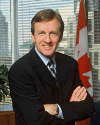 Ambassador Allan Rock spoke to the UN Correspondents Association last week on Canada’s proposals for picking the next UNSG. He elaborated on his government’s five proposals to open up the process, including two which he feels can and should be implemented this year.
Ambassador Allan Rock spoke to the UN Correspondents Association last week on Canada’s proposals for picking the next UNSG. He elaborated on his government’s five proposals to open up the process, including two which he feels can and should be implemented this year.
“Number one, let’s see if we can develop a consensus among member states that we should be looking for a one-term secretary-general – a single mandate. Let’s talk about how long that mandate should be, let’s weigh the merits of that step – if it’s agreed, let’s adopt it. And number two, let’s have an open process this year, let’s encourage candidates to come forward, let’s talk about a deadline by which candidates should be identified, so we don’t have a November surprise. Let’s have open fora with member states, meetings among candidates with regional groups, questions and answers so we can develop a feel for who these candidates are. Let’s not keep it a secret. Let’s not have it done in the backroom. Let’s have it done in the open. We believe the post is too important for us to take a different approach.”
Rock admitted that it was unlikely the world body could agree on a formal deadline this year, but that
“…if enough member states in the General Assembly make known their desire to be part of this process, to have the GA play its full role as contemplated by the Charter, I think we might politically get to the same result.”
On putting together the proposed public forums, he suggested the ease with which they could be organized within this year’s selection discussions.
“I observe just in passing that this past February, in Davos, Switzerland, the World Economic Forum managed to get persons who identify themselves as candidates onto a stage in front of an international audience to talk about their approach to the job. Well if the World Economic Forum can do it, why can’t the General Assembly of the United Nations? Why can’t we convene something at that lovely auditorium next door and put our candidates on the stage and have them make presentations and respond to questions? Why can’t we have them come and visit regional groups, and develop their understanding of regional issues, and respond to sensitive questions? Even if it’s only in private for the benefit of member states, we think that’s the way this task should be approached. So we commend these proposals to the membership, and we very much hope that we can put at least those two in place for the current year.”
Questioned on why there appeared to be silence from other governments on Canada’s proposals, the Ambassador replied, “Canada does not intend to let this matter drop. We intend to pursue the objectives we set for this year.” He said the government was encouraged by support it has received in closed sessions from “…very, very many states…that expressed impatience to have the General Assembly play its full role, and expressed their desire to see changes in place this year.” A recommendation from a committee discussing revitalization of the General Assembly is forthcoming, after which
“…it will be up to the PGA, the President of the General Assembly [Jan Eliasson], for example to convene or organize those public fora we’ve talked about, and engage in discussion with the Security Council about the other changes we’ve proposed.”
Rock underlined the importance of healing the divisions between states over management and other reforms that will face the next UNSG when he/she comes into office.
“…job number one for the next secretary-general commencing on January 1st will be to repair and address the cleavages that afflict this institution at this moment. Whether in the context of management reform, mandate review, the proposed resolution on development, the spending cap on the budget, the member states are riven by divisions. And those divisions have to be addressed if this institution is to be functional and successful. And I believe that the first responsibility of the new secretary-general in January will be to address those divisions and bring member states together in common cause. Not an easy task, but task number one.”
Rock noted his government’s view on other long-standing traditions, suggesting that regional rotation is “a contributing but not a controlling factor” in the selection process, and even that “if there’s a candidate from one of the P-5 countries who offers us outstanding leadership, and if it’s the will of the member states, I see no reason why that person should be barred from office.”
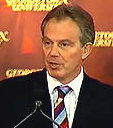 Blair’s speech at Georgetown reitereated the UK’s support for the management reforms proposed by Kofi Annan earlier this year, but which are opposed by most developing nations as encroaching on the General Assembly’s oversight role. (Watch the speech here.)
Blair’s speech at Georgetown reitereated the UK’s support for the management reforms proposed by Kofi Annan earlier this year, but which are opposed by most developing nations as encroaching on the General Assembly’s oversight role. (Watch the speech here.)
 Ambassador Allan Rock
Ambassador Allan Rock 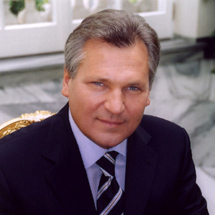 Kwasniewski, who led Poland during the country’s support of the U.S. war in Iraq,
Kwasniewski, who led Poland during the country’s support of the U.S. war in Iraq, 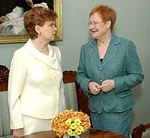 During a visit last month by President Vike-Freiberg to Finland to discuss economic ties with her counterpart President Tarja Halonen – herself recommended for the top post – both recognized the virtual certainty that the next UNSG would be an Asian national.
During a visit last month by President Vike-Freiberg to Finland to discuss economic ties with her counterpart President Tarja Halonen – herself recommended for the top post – both recognized the virtual certainty that the next UNSG would be an Asian national.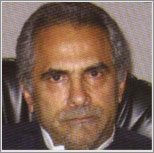
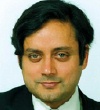 Last month, Shashi Tharoor, Under-Secretary-General for Communications and Public Information, opened the Committee on Information meeting at the UN urging reforms to
Last month, Shashi Tharoor, Under-Secretary-General for Communications and Public Information, opened the Committee on Information meeting at the UN urging reforms to 




